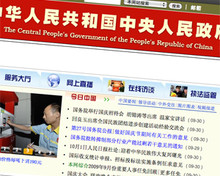
The premiere of a major Western film is a rare event in China. Just 20 foreign movies a year are allowed to be shown in Chinese cinemas because of a government imposed quota. On top of this, DVD and internet piracy are so endemic that a cinema run, let alone a glitzy premiere, is barely worth the effort.
So when Danny Boyle visited Beijing in March to promote Slumdog Millionaire 20 chosen journalists were given an unlikely opportunity - to create global headlines about a celebrity with no direct links to China.
It was to be an opportunity missed, as Boyle was bombarded with a series of inane questions relating to his favourite films and whether he liked China. Not one journalist asked Boyle to confirm or deny rumours circulating at the time that he was to direct the new James Bond movie - something that could have provided any Chinese media outlet with a world exclusive. As it was, his visit was barely covered in the West.
"There is often a Sino-centric aspect to Chinese reporters' questions, but in some ways no more so than other countries," says David Green, a journalist who has worked for both state-run and commercial print media in Beijing. "In my view, the point is that celebrities may let their guard down here for precisely that reason, but are seldom caught out for doing it. Rocking the boat is just not done in celebrity circles."
But that might be changing. In August Inter Milan manager Jose Mourinho launched one of his trademark tirades after being provoked by a question from a Beijing News journalist.
"I know why Chinese football is so rubbish and why China has won gold medals in so many sports but not football, it is because the journalists are so unprofessional," he angrily responded to the suggestion that his team had not been prepared to deal with the Beijing heat during their Italian Super Cup defeat to Lazio. The story ran across Europe.
While this may be the exception, the Chinese media is increasingly looking west for more readers. In April the Global Times, a new English language daily, was launched. The paper is owned by the People's Daily, a strongly nationalistic organ of the Communist party. Its title alone is an indication of its target audience. Elsewhere other media - such as state news agency Xinhua - are expanding their English language output.
But it will take a far larger, ideological shift before the Chinese media starts to produce content that interests the rest of the world.
"Chinese journalists often fall back on the 'what do you think of China?' line of questions, and hope they get a few answers that can make a headline," says Charlie Shifflett, a page editor at a state-run English-language weekly.
"Chinese tend to be very proud of their country. It makes them feel good to hear someone praise it - especially someone who is famous and influential."
The problem is that the China angle alone is rarely of sufficient interest to Western media consumers, and can even frustrate those being interviewed. When Shifflett attended a group interview with NBA star Shaquille O'Neal in 2007, one Chinese journalist repeatedly pushed O'Neal over whether he thought he was a better basketball player than fellow NBA star Yao Ming - China's biggest sporting celebrity.
"After the guy kept going and going, O'Neal kind of looked at me - the only foreign reporter in the room - for relief, so I jumped in with a question. He took his time answering it, seemingly relieved to talk about something else - anything else," recalls Shifflett.
Chinese journalists are rarely so pervasive. The Chinese celebrity PR machine has created a culture of financially rewarded deference amongst reporters. Slickly staged media events are held for the country's leading pop stars, where journalists are showered with CDs, DVDs, and often envelopes of cash.
In return, critical reviews of China's biggest stars are not common. When I slammed the latest album of Taiwanese singer Jay Chou - one of Asia's biggest pop stars - in a review for an English-language student-aimed newspaper, my editor exclaimed: "I've never seen someone write bad things about Jay Chou."
"If editors and the people in management are not pushing journalists to think outside the box and take risks in their reporting - political or otherwise - they will mostly continue to play second fiddle to the Western media machine," argues Shifflett.
Regardless of how much English language content the Chinese media creates, and without a doubt that volume is increasing dramatically, much will be lost to the West without a change of approach.
"While many Chinese criticise the Western media, they still defer to it on a host of topics, save political or sensitive ones," he says.
"I hope one day we'll see a more confident Chinese media. One, because I believe the Chinese perspective is sometimes ignored or misrepresented overseas; and two, because that will mean that the political climate has changed enough domestically so that reporters can feel free to pursue creative lines of inquiry - as well as more adversarial ones."
David Bartram is a freelance journalist, currently based in Beijing: http://davidjbartram.com / @DavidJBartram on Twitter.
Free daily newsletter
If you like our news and feature articles, you can sign up to receive our free daily (Mon-Fri) email newsletter (mobile friendly).
Related articles
- #JournalismMatters: The challenges of journalism in exile
- New guidelines call for the abolition of kill fees and fair payment practices for freelance journalists
- What to do if you are threatened with a SLAPP lawsuit
- WAN-IFRA: Five challenges to press freedom
- Economics woes affecting UK press freedom, RSF World Press Freedom Index finds









